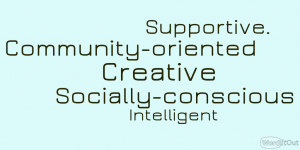I think all of us are aware of the effects branding can have on business. How many of you can see the familiar ‘swish’ and think, “Just Do It”? Or hear a beguiling British accent we now attribute to a gecko selling insurance and smile? Branding has a significant impact on sales by developing awareness, then affinity, and then loyalty from the consumer.
Some time ago, I was offered the chance to do a 360° assessment on my personal brand to discover what others think about me and my value as a coach, leader and team player. I had never engaged in a 360° feedback assessment before so it was a little scary. Asking others to provide honest, anonymous feedback about you requires a certain amount of courage. There’s also the fear that they won’t think enough of you take 10 minutes out of their day to complete the survey. I pushed the ‘send’ button after much deep breathing and a commitment to learn from the experience, come what may.
Surprisingly, almost half of my candidates provided feedback, which was the first remarkable moment. Next, I discovered that they had really great things to say about me! My most common personal brand attributes were Creative, Socially-conscious, Community-oriented, Intelligent and Supportive. My brand personas were Philanthropist, Caregiver, Self-starter, Expert, Motivator and Giver. Imagine how wonderfully these words penetrated my psyche! My greatest strengths resonated along these same lines.
Then I came to the part I was dreading – the feedback on weaknesses. Short comments spoke to the fact that I overextend myself and sometimes don’t follow up. I get caught up in stress and don’t make enough time to accomplish what I would like. I don’t always trust myself to know when to say no. Did these comments surprise me? Absolutely not. Did they make me feel bad about myself? Actually, they did just the opposite. They allowed me to see what I already knew through the eyes of the people I work with, provide service to, and collaborate with on teams, boards and projects. I understood the theory of self-care and setting strong boundaries, but I saw the effects on my personal brand first hand. It gave me a lot to unpack and examine in order to improve the way I do business – and create my personal brand.
Discovery through this lens caused me to begin the process of reshaping my boundaries and dramatically simplifying my life, to really look at the ways I can provide value to others in a new and streamlined way. The process seemed a little daunting at first, but it turned out to be an invaluable experience. And although I may not continue to engage in such a systematic way of gathering a 360° reach, I can continue to evaluate my personal brand using external feedback and so can you.
I used Wiliam Arruda’s 360 Reach assessment and I highly recommend it. But while I think that everyone should engage in a formalized 360° assessment at some point, there are some quick and informal ways of getting to the heart of what others believe to be true about you. You can create a personal branding survey using tools like Survey Monkey or Zoomerang, which both offer a free 30 day trial and a mechanism for anonymous feedback. You can just create a set of questions or a list of words you would like your closest friends, colleagues or loyal clients to comment about. Discovering your role on a team or your projective attributes can really assist you in examining how you work best with others and where your challenges might lie. Looking at how you form boundaries or what value you may or may not provide is critical feedback if you provide client services. Do your clients or colleagues have a high level of trust in your abilities? Are you overextending yourself? Chances are, this information can help you understand what others unconsciously or consciously think about when working with you.
Sure, this process can be a little daunting. But it can also be a tremendously rewarding experience. You may not have a catchy slogan or a likable mascot for your business, but chances are the uniqueness of you is pretty beguiling!
I’m including a document Informal 360 Assessment – Words that Describe Me with a list of words that might get you started. Use them in your assessment with others or as a springboard to create your own set of words or questions.
If you’d like to do this type of work with your staff, I do this all the time and find it be very effective in creating more cohesive, dynamic teams. Or, if you’d participated in a 360 type assessment, but want some coaching on how to implement what you’ve learned, let me know. It’s one of the best springboards to success.
If you take this on, let me know how it goes. Leave a comment below or reach out on Facebook.

Word Cloud of my Assessment results


